I believe you will not damage the engine of a brand new car by pumping dirty oil into it.
Even if you do, it is still possible to get it repaired.
And if the engine finally breaks down, you could just pay enough money to have the whole engine replaced or simply buy another car again.
The bad news is…
We cannot replace the only vehicle that carries us through life as we did with a car. That is our bodies.
Every time we take a drag of a cigarette we are breathing cancerous fumes that have the potential to cause harmful damage to our internal organs.
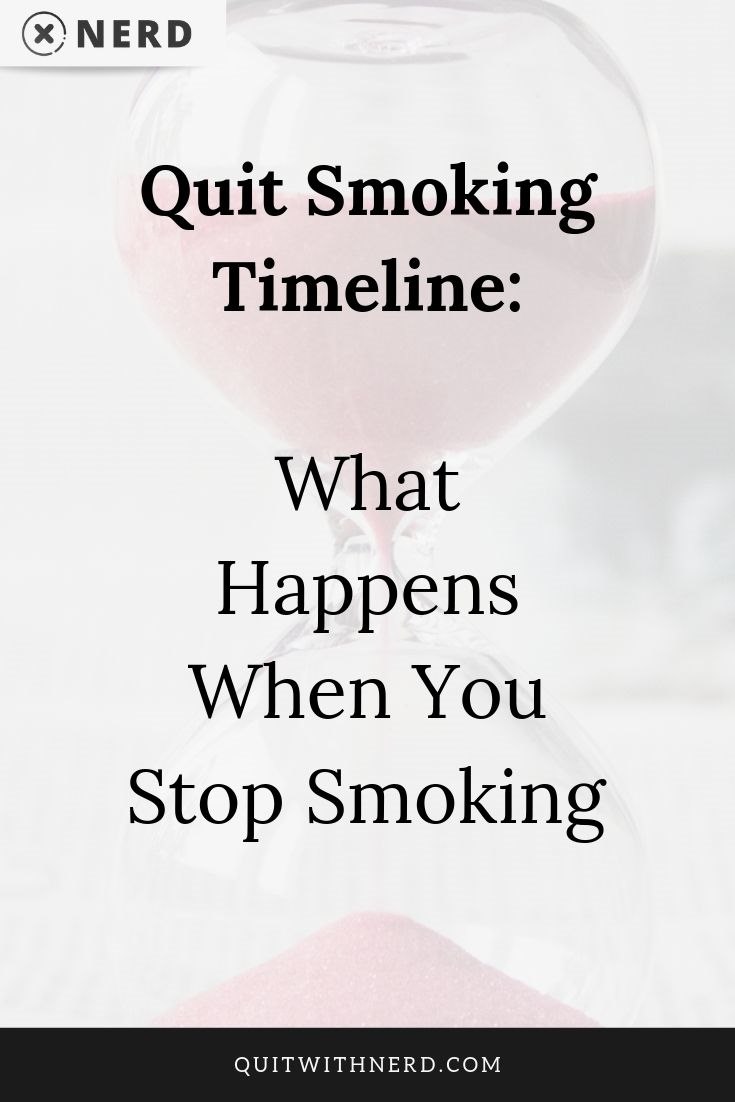
Contents
What to Expect After You Quit
I have no intention of using scare tactics because those things do not work. If they do, it would have worked a long time ago.
I believe you are here because you are already planning to quit (or at least you have the intention to).
If you are worried how much damage you have already done to your body then all I can say is keep your worries aside and just keep reading – you will feel significantly better by the end of it.
Here, I will show you a timeline on how your body marvelously heals itself and also share with you all the health benefits you will be reaping starting from your quit day.
Health benefits are pretty obvious. I am sure you already know a couple.
But more importantly…
You can also expect a richer life; not just in terms of finance (in fact, finance is the least ‘important’ gains you are about to experience in my opinion) but a whole range of riches that also include your psychological well-being and the way you look at yourself.
Do You Have to Worry About Nicotine Withdrawal?
Yes and no.
Take a look on the internet (just do a quick google search) and you will see how many health establishments claim that nicotine has ‘serious’ withdrawal effects.
Then they kinda promote to you saying that the best way to fight nicotine withdrawal is to purchase their service(s), buy their Nicotine Replacement products, sign-up for their rehab programs, etc. – This is not referring to all health establishments but many.
Think about it, it makes sense if they want your business.
The seriousness of Nicotine Withdrawal depends on how you perceive it.
Read that again.
The seriousness of Nicotine Withdrawal depends on how you perceive it. Click To TweetOr interpret it.
If you believe you have to suffer hell on earth to get through nicotine withdrawal, you are right.
If you believe that nicotine withdrawal is not a big deal and that you can get through easily, you are also right.
“Whether you think you can, or you think you can’t – you’re right.”
I am not denying that there is absolutely no withdrawal – physically or mentally – there is.
But the truth about it is that… it is so mild.
Scientifically speaking, if nicotine withdrawal is as serious as they claim to be, tobacco and the use of nicotine products would have been banned a long time ago… as was the case with heroin, cocaine and other drugs that have serious withdrawal effects.
The threat of nicotine withdrawal is like having a cat on your doorstep but in your mind, you interpret it like a tiger.
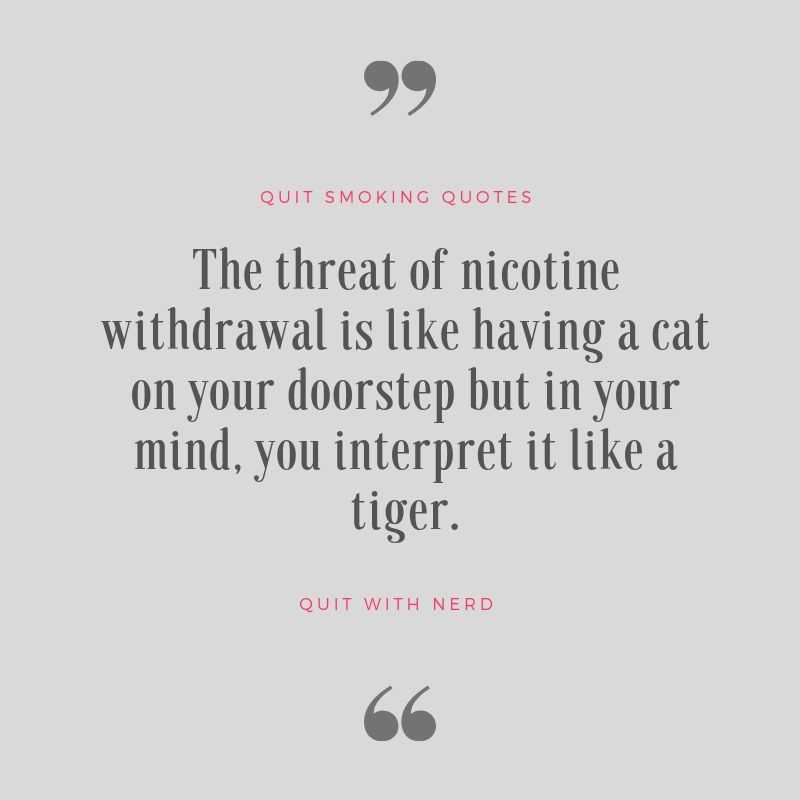
How are you going to face this cat when you think of it like a tiger?
Nicotine is just a big bully who enjoys lying to you. If you know the truths and confronts him head-on, he runs just like every other big bully. Click To TweetI will write a detailed post about the truth of nicotine withdrawal (updated on 20 June 2019) in the near future. But for now, I rest my case.
Let’s get back to the topic.
What Happened When I Stopped Smoking
For me, the first thing people noticed about me when I stopped smoking was my outward appearance. More precisely, my skin.
It was:
- Wonderful to have healthier nails, teeth and younger-looking skin.
- Awesome to know that I have a stronger immune system to protect my body from harmful diseases.
- Fantastic to know that my performance in sports (and in bed) improved significantly.
- Nice to save a couple of bucks here and there.
But the most crucial advantage of being a non-smoker is to know that I have finally broken free from a lifetime of slavery.
My self-respect and the way I define myself was different after I stop smoking. The result of this was increased confidence.
My attractiveness and confidence level kinda manifest itself from the inside out.
It was as if many years of lost confidence had finally been regained.
That to me was the biggest win when I finally decided to stop smoking and stay smoke-free. The rest were extra bonuses.
Willpower Quitters Seldom Get This
But know this…
Throughout my journey of quitting, I had attempted more than 30 cold-turkeys but I didn’t feel or experience the feeling I described above for even a single time.
How is this possible?
As mentioned in my previous post on how to quit smoking, it is imperative that we first invest in our mindset or sharpen our ax as I like to call it.
If we use our willpower (or ANY other methods) without first investing in our mindset then it is easy to interpret our cat like a tiger. It is easy to fall into depression and relapse. It is easy to think that cigarettes are the source of our ‘happiness.’
Read: Cold Turkey: The Danger of Using Willpower to Quit Smoking (MY STORY)
Without first investing in my mindset; ALL my attempts garnered the worst feeling imaginable. The feeling that I was depriving myself of an ‘enjoyment,’ the feeling of envying smokers, the feeling of indigence.
It is not surprising that I didn’t celebrate my wins and neglected those positive feelings that I was supposed to have.
In short, I felt like shit every time I went cold-turkey.
I started gaining weight, throwing tantrums, getting into fights without any apparent reason all because I didn’t take the initiative to learn the truth about quitting first.
Quitting is NOT difficult. In fact, it is truly enjoyable if you first invest in your mindset.
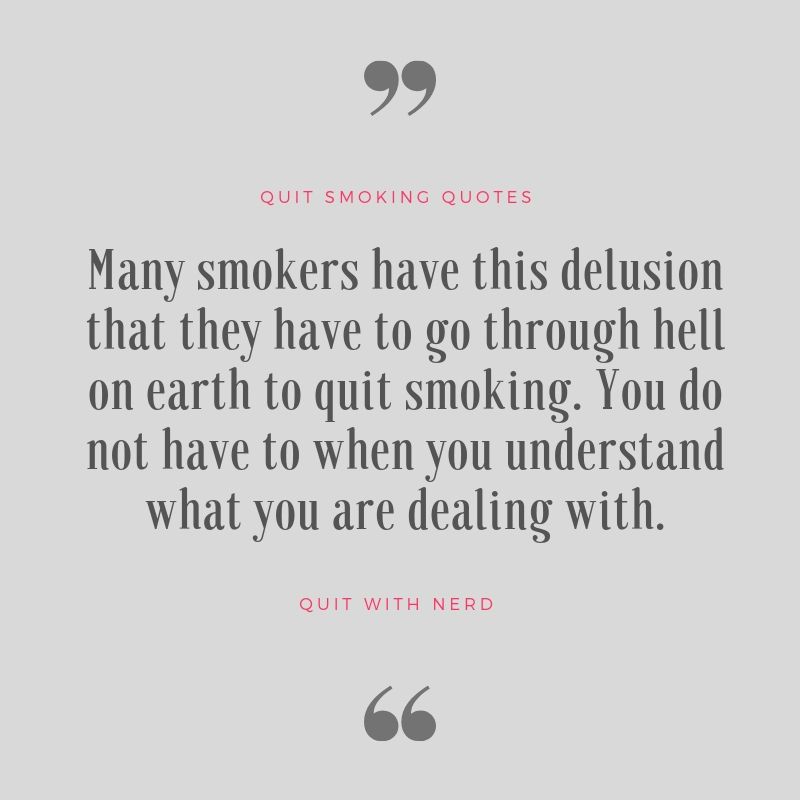
What Happens When You Stop Smoking
The benefits of quitting are pretty universal. The only thing that may differ is our values.
For instance, I value the conversation I have with myself (aka my self-confidence) more than I value my health, my outward appearances, and my finances.
For you, perhaps you are around people every day so you might value your outward appearances more than the rest.
My point is to focus on those that matter most to you and magnify it… especially if you are looking for a hypnotherapist or a behavioral therapist to assist you in your smoke cessation aid. It is gonna be very helpful!
Without further ado, let’s have a look at what happens to your body after you quit:
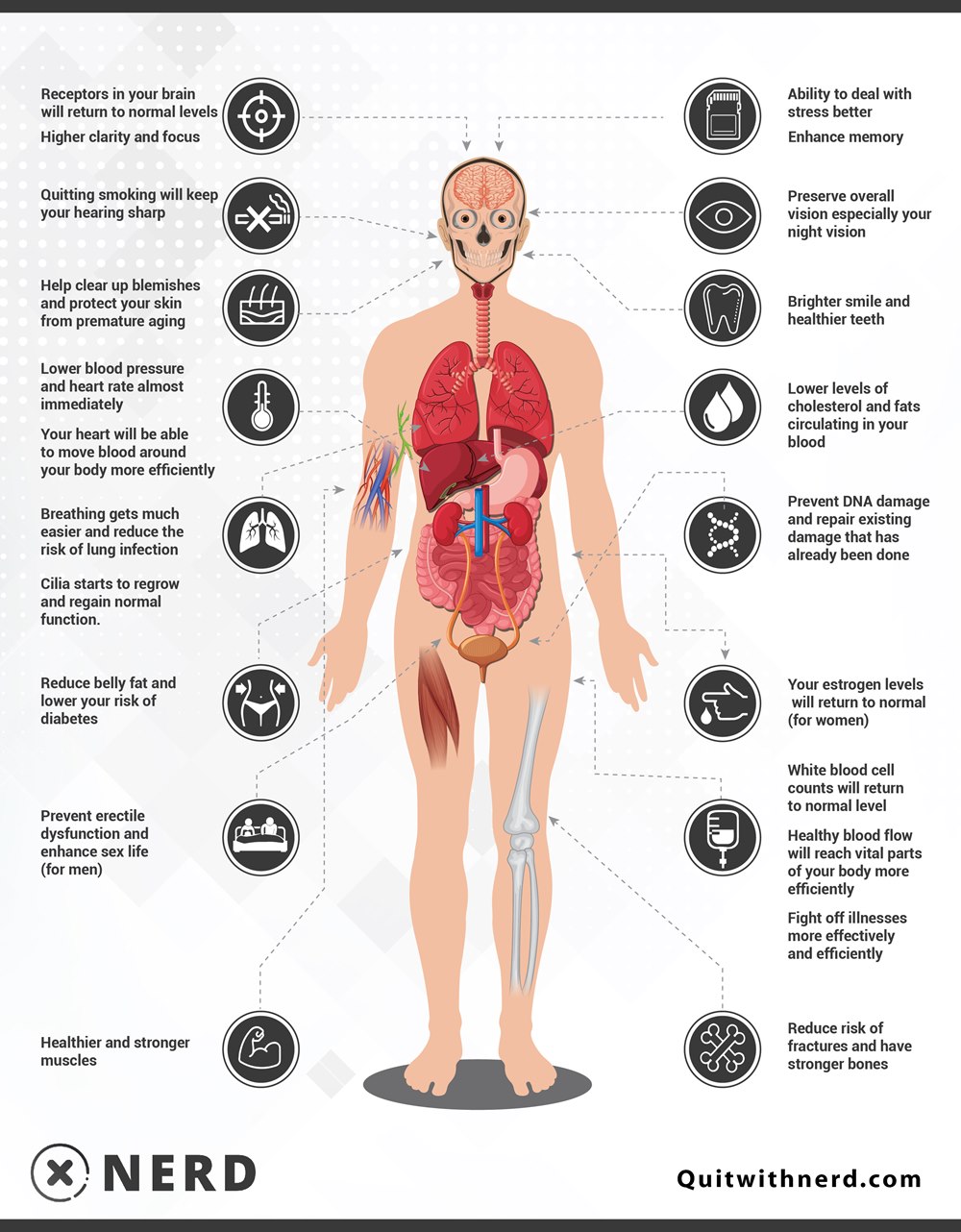
Pretty amazing, ain’t it?
Sit back. I have something else I’d like to show you.
Quit Smoking Timeline
When a person quits smoking their body goes through a number of changes. These changes can begin almost immediately, and will have a drastic impact on the overall quality of that person’s life:
20 Minutes
Within 20 minutes of quitting the body begins to normalize blood pressure and pulse. Circulation to hands and feet allow for better temperature regulation.
Bronchial tubes begin to move again, which moves debris and germs out of the lungs and prevents infections from forming. Smoke in the lungs prevents this movement.
8 Hours
After eight hours without smoking, the body begins to purge the carbon dioxide that smoking builds up. It roughly halves the amount of carbon dioxide in the bloodstream. Oxygen levels are thus able to return to normal, as the carbon dioxide takes up space that your blood would normally use for needed oxygen. By returning to normal oxygen/carbon dioxide levels blood and tissue begin to function normally again.
24 Hours
After one full day without smoking, the nicotine in the body is almost entirely expunged. Veins and arteries become less constricted as more oxygen is funneled to the heart, increasing its overall health and making it work less to do its job. After a mere 24 hours, the risk of heart attack is reduced significantly by these changes.
48 Hours
After two days the senses begin to return to normal. Dulled by the smoke, senses such as taste and smell begin to heal after 48 hours, causing often-noticeable increases to their efficiency.
It is at this point that nerve endings damaged by smoking and carbon dioxide begin to regrow.
48 hours is also when most people begin to feel withdrawal symptoms in earnest. Physical effects like hunger, sleepiness or headaches begin to show up, as does psychological symptoms like irritability and depression.
72 Hours
Three days after the last cigarette and breathing become easier. Bronchial tubes in the lungs begin to relax and open up again, making the exchange of oxygen and carbon dioxide flow better. Lung capacity is also increased at this time.
5 to 10 Days
In the five to ten-day range the body’s overall health and functionality increase dramatically. This is also the time frame for an increased chance of quitting for good: After one full week without smoking, smokers are nine times more likely to succeed if they have successfully abstained during the week.
After ten days the average former smoker will be down to two episodes a day for their cravings. Averages are tough to apply to the individual, but this is a far cry from the cravings during the early days of quitting.
2 to 12 Weeks
By the two week mark, there is a noticeable improvement to circulation and oxygenation in the body. Decreased stiffness and increased mobility, especially in the extremities, are often marked at this stage. The lungs also increase their capacity by 30% at this point.
After a full month without smoking, the lungs begin to regrow tiny fibers that help keep the lungs clear of mucus and infection. Increased energy levels and breathing capacity are other notable effects after a month.
It becomes easier to exert yourself physically at this stage as well. The lungs have repaired themselves enough to easier be able to handle the increased workload that comes from exercise.
The most severe symptoms of withdrawal will have run their course by this point for most, though they can still persist in diminished form for a while.
3 to 9 Months
After three months the fertility rate of females is increased while the chance of smoking-related birth defects drops.
At six months of no smoking, the airways of the lungs are in much better shape and far less inflamed, resulting in less mucus and phlegm buildup and, consequently, less coughing these substances up. Energy levels are often much higher after six months, and many people report that they can handle stress much better and without the feeling that they need a cigarette.
1 Year
Considerable improvements to breathing quality and lung capacity are gained after a year of being smoke-free. Energy levels are up and physical exertion is much easier, resulting in less wheezing and coughing. Lungs are generally in much better shape after a year, having healed much of the damage done to them by smoking.
Three years after quitting the chance of heart attack evens out to that of a non-smoker. After this, the damage done to the circulatory system has largely been repaired, meaning there are no more smoking-related factors in heart attack chances. This is a meaningful milestone, especially for anyone at a high risk of heart attack already.
5 Years
After five years of not smoking the chance of lung cancer drops by half. After this long without smoke, the lungs are functioning much better and the process that leads to lung cancer is simply less likely to happen.
Many cancer risks are halved by this point, including cervical cancer and mouth cancer.
10 Years
At the ten year mark, the pre-cancerous cells left in the lungs from damage done by smoking are all but gone, replaced with healthy cells. This means that the odds of lung cancer are equal to that of a non-smoker. The chances of getting other smoking-related cancers also drops off, with cancer in the mouth, esophagus, kidneys, pancreas, and bladder all reduced significantly.
15 Years
At the fifteen year mark, the body is almost out of the woods. The natural processes of cell replacement have all but eliminated the damaged cells from smoking. Chances of heart disease, stroke, and other ailments become that of the average non-smoker in the same demographic.
20 Years
After two decades the body has recovered as much as it can from smoking. Average health risks still apply, but the chances of increased danger are all but over with.
An Infographic of Quit Smoking Timeline
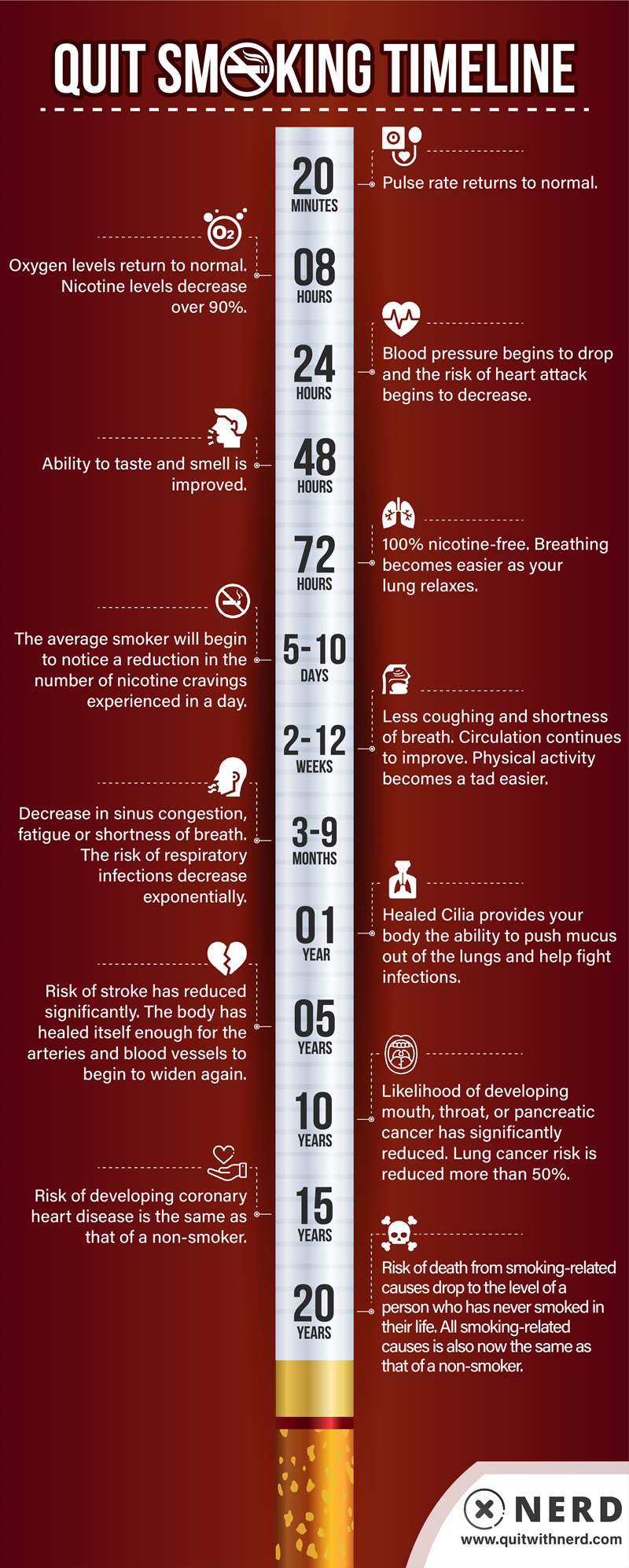
TED-Ed: How Do Cigarettes Affect The Body
My Hope for You
The increased short and long term health benefits of quitting are well documented in many studies and there’s no doubt the quality of your life will improve significantly.
The only thing I hope for you is to keep reminding yourself to celebrate these wins and do not allow the lies of nicotine withdrawal to fail you yet again.
“A day of being smoke-free is a day win.” Keep celebrating and count your blessings.
Fighting nicotine withdrawal is EASY (updated on 6 July 2019). You have been doing it throughout your smoking lives – more on this in a later post.
The most difficult fight is the battle in your mind. If you continue to believe in the lies that smoking gives you ‘pleasure’ or that smoking is ‘enjoyable’, you will relapse sooner than you think.
Read: 5 Reasons Why Smokers Find it Difficult to Quit Smoking (HARD TO QUIT)
Getting through nicotine withdrawal is EASY; the battle in your mind is not. Click To TweetI really cannot stress the importance of investing in your mindset first before quitting.
Understand not just in your brain but in your entire being that smoking does absolutely nothing for you.
You can continue to mix with your smoking friends if you wish but don’t envy them; pity them – I mean really pity them – because they are slave-driven by the nicotine drug bully. There’s really nothing to envy about that.
Share This
If you have learned something from this article, share it with your loved ones who are still smoking.
Thanks for reading.
I hope I have been of service to you and your loved ones.
Cheers to a better life!
Sincerely,
Jeremiah Say

